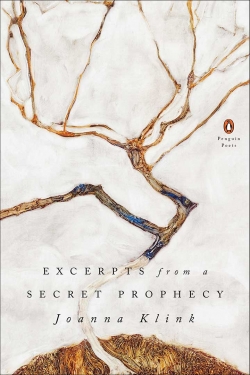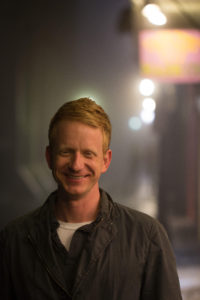 Talea premiered Scenes 2-5 of Maxwell Dulaney’s “Already Root” in April 2018, after working in-person in residence in New Orleans. We brought the show back to New York to close our mainstage season on April 13 at St. Peter’s, alongside works by Courtney Bryan, Anna Walton, and Rebecca Saunders. Read on to learn more about Max’s current and upcoming projects…
Talea premiered Scenes 2-5 of Maxwell Dulaney’s “Already Root” in April 2018, after working in-person in residence in New Orleans. We brought the show back to New York to close our mainstage season on April 13 at St. Peter’s, alongside works by Courtney Bryan, Anna Walton, and Rebecca Saunders. Read on to learn more about Max’s current and upcoming projects…
ZS: Max, I’d love to hear more from you about the history of Already Root, the one-act opera Talea premiered in April.
MD: Well, this project is something that developed in my mind around 2008…
ZS: Wow, a long time ago!
MD: Yeah, but I had to put it down for a while after that. I had gotten a Wellesley Composers Conference Fellowship in 2008, and I was looking for a piece to do. I was trying to incorporate the full ensemble, and I started sketching out an aria for Eurydice. I had been reading Orpheus.Euryduce.Hermes by Joanna Klink, a professor at University of Montana, which is her retelling of Ranier Maria Rilke’s by the same title. The voice in the poem—her language, her imagery—is an almost sardonic look at the whole thing. It’s not quite cynical, but it really twists the perspective and makes Orpheus look more clueless and selfish. Klink gives us a Eurydice who feels extremely conflicted about the whole process that’s being thrown upon her. Eurydice also gets frustrated with being uprooted. Most importantly, in both of these poems, but most emphatically in Klink’s, Eurydice is portrayed with more autonomy and agency than she normally is in the telling of the myth.
I was just really attracted to the poem. In a way it was very naïve: I really like this poem and I’d really like to try to set it. So, I emailed Joanna Klink, and she said it would be fine.
After I started doing some sketches I realized it was turning into a bigger project than I was going to be able to complete by the deadline, so I had to table it. Then, around 2015, I was starting to look for another big project, as I was applying to the Atlas Grant to fund the composition of this piece. I wound up getting it, so I really had to do it!
I also only used texts from the Klink and from Rilke in that original. I hadn’t established the libretto-composer relationship yet, with Lauren Slaughter.
ZS: Let’s talk a little more about that. What was it like working with her? How did you find her and decide she was the right fit for the project?
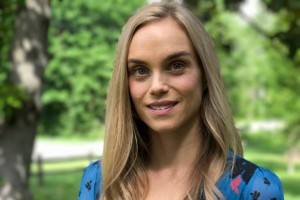 MD: I’ve known Lauren for maybe 20 years. She moved to Tuscaloosa, Alabama, with her now-husband, who was a friend of mine. She’s one of the first poet friends I had, and her work was quite inspiring to me. I went to a few of her readings. I was blown away by her control of language and her ability evoke these intense emotions within her writing—but also writing very simply and clearly in her poetry. I can’t really think of another poet she reminds me of. She feels so authentic, to me.
MD: I’ve known Lauren for maybe 20 years. She moved to Tuscaloosa, Alabama, with her now-husband, who was a friend of mine. She’s one of the first poet friends I had, and her work was quite inspiring to me. I went to a few of her readings. I was blown away by her control of language and her ability evoke these intense emotions within her writing—but also writing very simply and clearly in her poetry. I can’t really think of another poet she reminds me of. She feels so authentic, to me.
But, we had never really talked about doing anything together. We had always just talked about our work, and were very supportive of each other.
I was waiting in line to get a drink at a wedding when it hit me. It was like satori. I texted her, and by the time I had my beer, she said she was interested.
ZS: You’re kidding! That’s so funny.
MD: Well, shortly afterward she and her family moved to Montana and while she was there she studied with Joanna Klink. When I wrote to Joanna to tell her I was going to work with Lauren she was so excited! There’s this full circle going all the way back to the Klink poem and working on the libretto with someone who studied with her.
Ultimately, I just wanted to work with someone I really trusted. The catch was that I had never written an opera and she had never written a libretto. So, that was a learning process from the beginning, for both of us. But, it was a lot of fun.
ZS: I asked this question to Lauren in my interview with her, but I’m curious to hear your response. What’s it like to work on an opera with a poet librettist, considering English is such a challenging language to set? It’s so rhythmical already; it risks on the one hand merely sounding accurate or on the other sounding really strange—as though done by someone who didn’t understand how English works. It’s hard to find something in the middle. The way Benjamin Britten or Thomas Adès or George Benjamin handle that have all been really distinctive, for example. I’m wondering what working relationship you and Lauren settled into on this—the way language flows from a poetic text on the page into a sung text in the tradition of your music.
MD: Yeah, it’s a difficult thing. I have a similar predisposition away from using English. I’ve set Spanish (some Neruda), and I used German with the Rilke. But I never set full thoughts of the Klink: it was just phrases. That helped. I thought a lot about stretching syllables or adding melisma to vowels, to get away from that inherent rhythm of the English language.
It’s a tough thing, and for Lauren it was a little different. I really enjoyed reading her interview about it, since she has to deal with the English language and implied poetic rhythm all the time. She plays against that, some, but she also embraces it, in her poetry. She gave me a lot of freedom to do what I needed to do, which was also nerve-wracking because I was afraid she was going to hate it.
ZS: She gave you just enough rope…
MD: [laughs] Exactly. You know, I listened to a lot of non-English vocal work to try to think about language in a different way than I’m used to. That was really the most difficult part. Sure, I can do an abstract “breaking-text-apart” approach, repeating certain words—and I do some of that. But, I didn’t want to rely on those things as crutches and thus lose the meaning of the text.
Unsuk Chin’s Akrostichon Wortspiel, mvt VI, Das Beliebigkeitsspiel: a virtuoso tongue-twister…
ZS: Sometimes it’s amazing, but sometimes those things are uninteresting precisely because they’re easy to do.
MD: Yeah. I like to do it some. It’s actually one of the things that drove me crazy about the first scene. It begins with Eurydice re-finding her voice. She’s learning her tongue and her lips and her body, again. So, that’s an important part of it, and works within the larger imagery and drama of the work itself.
Since there’s a lot of that in the first scene, I had to step away from it for a while and get a new perspective. I’m glad I did that in the end. I was beating myself up, but now I really know it can work in a piece. There are a lot of hard sounds in English, so it’s a natural place to go—but it’s also really easy for it to sound like a gimmick.
ZS: So, the last step to finish the whole work is the first scene. But I’m also wondering—now that this has come through two rounds of a concert production with scenes 2 through 5—how much do you think you’ll go back and edit what you already have?
MD: That’s a really good question. I’ve been thinking about that a lot. When I first conceived of this piece it was going to be about 30 minutes. But, as I started writing more and more, I realized it’s not 30 minutes: in its fullest form it’s more like 45 minutes. For example, there are some interludes and a prologue that will be added, in addition to the first scene. I think there is some expansion that I could use to do more service to the drama of the piece and to the narrative. There are a few spots where I feel like I could spend more time in certain spaces.
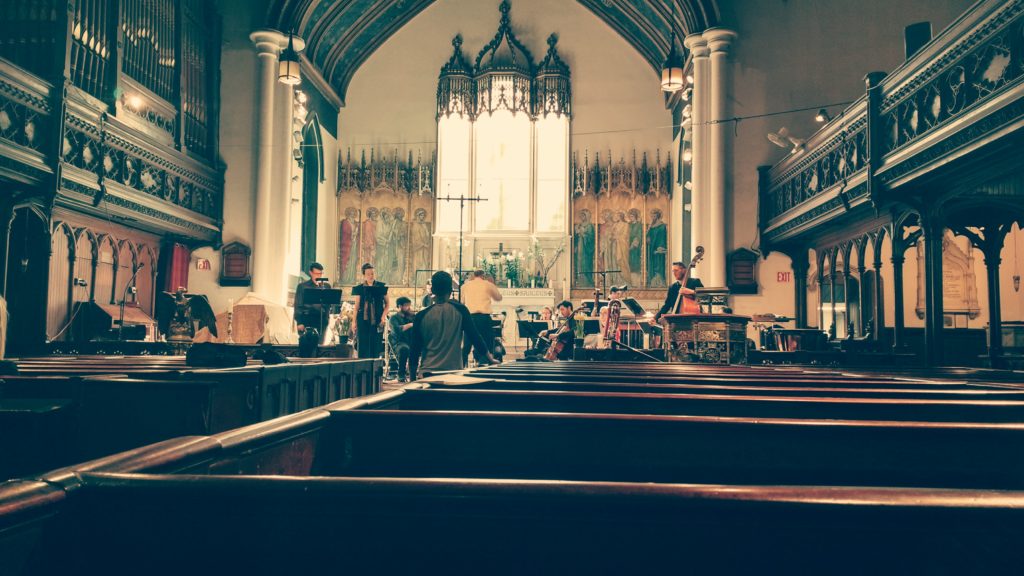
Dress rehearsal for Talea’s performance of Already Root on April 13, 2018 at St. Peter’s Chelsea
ZS: What are your plans for the dramaturgy of an eventual semi-staged or fully staged production?
MD: I had an idea in terms of the tone of the scene or the staging—about how it should feel—but I want to leave room for whoever I work with. The set needs to be simple and dark with something incorporated that can be used with video projection, like a triptych of panels.
Eurydice is in Hades; she’s been buried. So, she would probably be dressed in some kind of grave cloth. A simple grey muslin would be great. An obvious addition to this could be some type of roots, or an allusion to roots, since the opera is all about her being rooted, as well as the tree-nymph imagery involved with Eurydice. For Hermes, I would want him to be a contemporary version of the messenger God that he is, but still connected to the overall aesthetic of the staging.
ZS: Like a FedEx bag, kind of thing?
MD: [laughs] Right, exactly. UPS definitely wouldn’t work.
ZS: Perfect. It would match really well with the muslin.
MD: I would also like to have some simple and effective lighting that works with the music. Not necessarily something that follows the music—but that there’s a relationship. The set could have some kind of reflective quality. You can do some really cool stuff with mylar, and then reflect different colors off it. This could be quite effective, for example, when Hermes enters, since Lauren describes Eurydice seeing him as an orb of light as he enters. You can create intricate lighting effects without a whole lot of complex lighting system.
ZS: So, what’s the next step, then, for you, with the opera? You’re looking at possible places to do a complete performance?
MD: Yeah, I would love to. Lauren and I both want to have a fully-staged version happen. We’re looking at some things, but it’s all in the early stages. I’m sending around copies of the score and recordings to some institutions to see if they’re interested. Some have already expressed interest in a staged version.
ZS: What about your composing, otherwise? You’ve got a lot going on in your life right now, but what are the big things keeping you busy?
MD: When you ask me that question, I realize how fortunate I am to work with so many amazing musicians who are extremely committed to performing new music! This summer is a summer of finishing solo and solo + electronics pieces. I recently wrote a piece for Andy Kozar for trumpet + electronics. We’ll be working on some revisions and then going into the studio in August or early fall. Carlos Cordeiro has also commissioned a piece for contrabass clarinet, which he will premiere at his Open Spaces concert at Darmstadt this year.
Then, there is a piece I am writing for myself for harmonica + electronics. I’m super excited—and nervous—about this one, as it is something I have been wanting to do for some time.
One of my larger ensemble projects coming up is for the Astralis Duo. The Astralis Duo has a project called Rising Water in which they are commissioning local composers to write pieces dealing with sea level rise and climate change, and how that impacts the Gulf Coast Region. You can read more about them here or on their website: https://www.astralisduo.com/about
I usually don’t venture into topical issues in my work, or not so explicitly. However, this is an issue I have cared intensely about since I was twelve and had the realization about the dire condition we and the world were in.
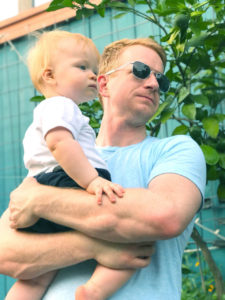 Finally, as with most new composer dads, I am super into the beautifully curious, exploratory babbling and vocal experimentation of my son, Felix. I have been recording him since he was born and am working on a few ways to incorporate him into material for pieces and probably compose an electronics piece out of the recordings.
Finally, as with most new composer dads, I am super into the beautifully curious, exploratory babbling and vocal experimentation of my son, Felix. I have been recording him since he was born and am working on a few ways to incorporate him into material for pieces and probably compose an electronics piece out of the recordings.
Recently assigned the position of Assistant Professor of Composition & Theory at Tulane University, Maxwell Dulaney received his M.A. in Composition and Ph.D. in Composition & Theory from Brandeis University. Awards include a 2009 Mellon Dissertation Research Grant, a 2008 Wellesley Composers Conference Fellowship, and 1st Prize in the 2006 ASCAP/SCI Student Composer Competition. Mr. Dulaney has been published in the SCI Journal of Musical Scores, Vol. 45 and his music has been recorded on the Rainbow Classical label by the ensemble Mikrokosmos. Read more at: http://maxwelldulaney.com/.
